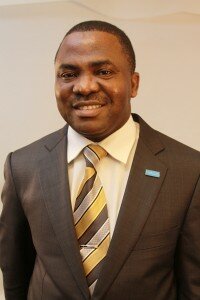 At the recent “Uniting to Combat NTDs: Translating the London Declaration into Action,” we had a chance to catch up with Adiele Onyeze, Neglected Tropical Diseases and Strategic Management Expert at the World Health Organization (WHO).
At the recent “Uniting to Combat NTDs: Translating the London Declaration into Action,” we had a chance to catch up with Adiele Onyeze, Neglected Tropical Diseases and Strategic Management Expert at the World Health Organization (WHO).
Global Network: What is one wish that you have that will help control NTDs in Africa?
Adiele Onyeze: There’s a lot for the community to be proud of when we’re able to achieve or eliminate NTDs from Africa. And to make that happen we need to accelerate progress in terms of scaling up implementation. We need to ensure we complete the mapping of NTDs in Africa and that we build capacity. However, to make all this more effective we need to strengthen coordination and make sure that we are able to mobilize resources. We are glad that [the Global Network], as a major partner, is working with AFRO, and together we are moving this agenda forward. We can actually look forward to success in the near future.
Global Network: What is the significance of mapping NTD control and targeting specific communities for mass drug administration (MDA) and implementation?
AO: We’re focusing on 10 NTDs, five of them are amenable to what we call preventive chemotherapy while the others require intensive case management. For us to make a real impact, we need to know where the diseases are. Up until now only about half of the countries have been mapped, so we do not know where the disease really is in about half of the countries. There’s an urgent need to complete the mapping of all of these NTDs, especially now with funding available for the preventative chemotherapy NTDs.
The mapping is kind of complicated because you’ve got to assess the burden of five different diseases using different diagnostic methodologies, affecting different parts of the communities, and using different expertise. Some will be experts in laboratory, some will be experts in working with flies or vectors, and some will require experts in immunonology who will be able to read blood thin strips. Others will have to look at stools, some urine. A lot of work has to be done to be able to actually map these NTDs and that’s why we have now moved on to AFRO – to get the countries to work around an integrated approach to coordinated mapping.
Global Network: Can you give an example of what NTD mapping and MDA implementation looks like on the ground?
AO: We had a workshop in Lusaka, Zambia to work with all the partners to agree on one coordinated guide for mapping. At that meeting we also trained about 30 experts who are now available to work with each of the countries to develop, what we’d now see as, a three-phase approach to complete all of the mapping, plus the budget. The second phase will be for the experts to go and do the actual mapping. Lastly, the third phase will involve using the results of the map and refining each country’s individual plans, needs for MDAs and operational requirements. The mapping process is key, but we’ve now coordinated to make it efficient, fast and successful!
Global Network: What is one thing you are most proud of in your work with NTDs?
AO: I’m proud of the countries that have now taken it upon themselves to give top priority to NTDs and to establish strong NTD programs. I am also happy for many of the partners who are now committing to support this process as NGOs, donors and also as industries. Actually, I’m proud of this community and this momentum that is now developing around NTDs. It’s a cause for joy, because it’s going to make a big difference in the lives of many people, especially in Africa.

